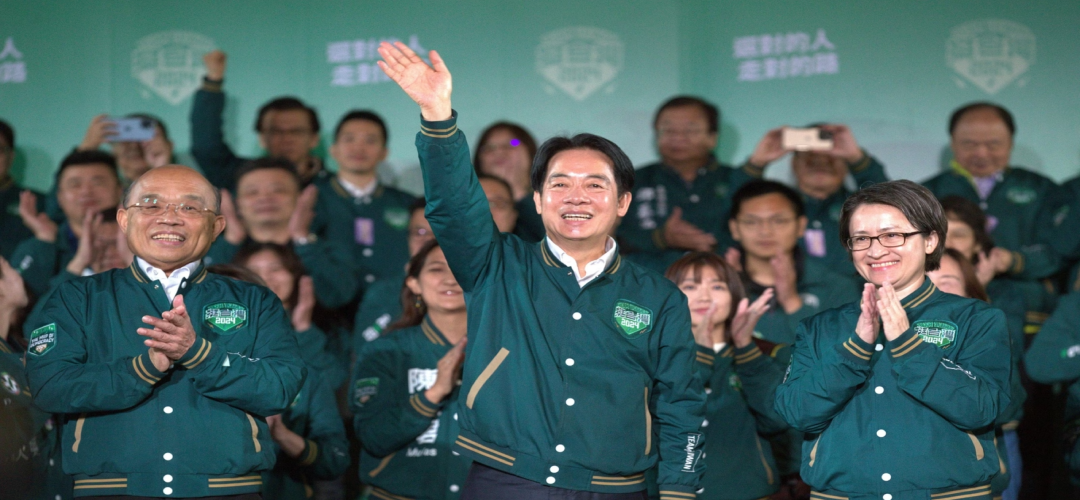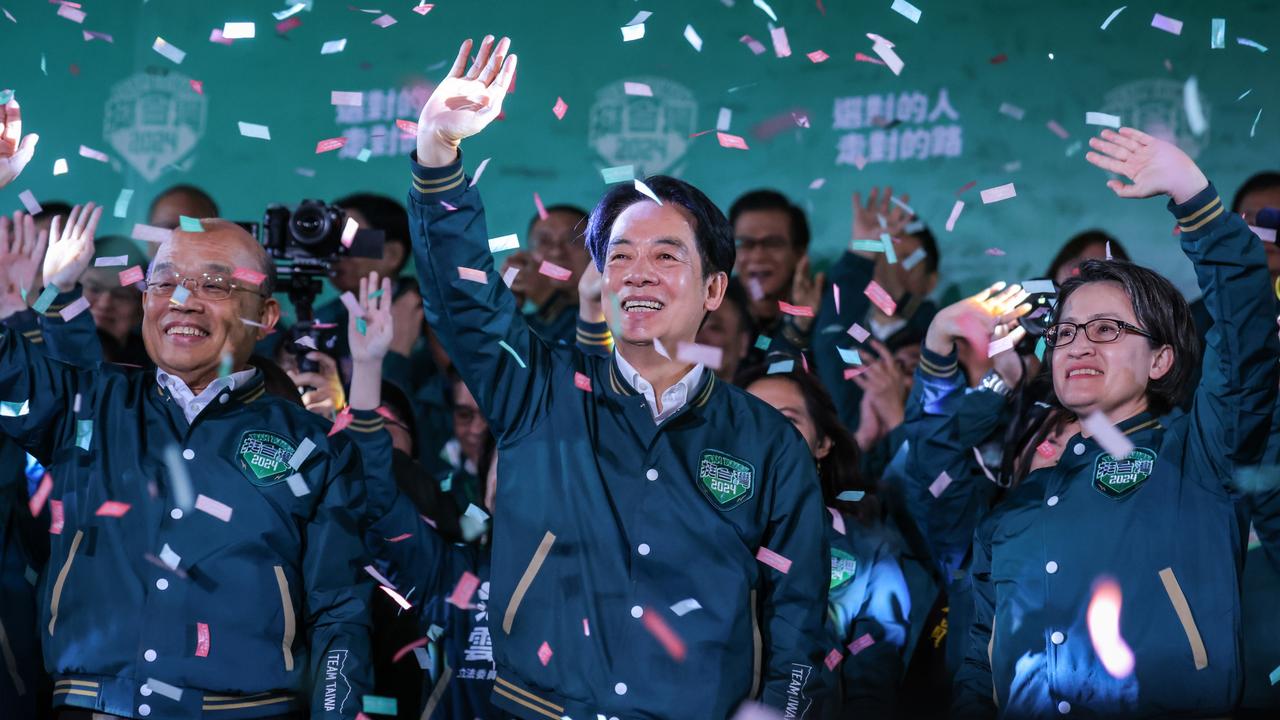Cocking a Snook
January 20, 2024 | Expert Insights

William Lai, a China-sceptic known for his track record supporting Taiwan's independence, secured victory in the recent Taiwanese presidential election. Lai's win marks an unprecedented third successive term for the Democratic Progressive Party (DPP). DPP is a veritable thorn in the side of Beijing due to its advocacy for Taiwan's sovereign rights and close ties with the U.S., Europe, and other democratic forces.
The election, labelled as the first major global geopolitical watershed of 2024, has escalated tensions between China and the U.S., particularly in the context of the South China Sea.
Background
William Lai, a 64-year-old Harvard graduate has been long associated with the Taiwanese independence movement. In 2017, he referred to himself as a "pragmatic worker for Taiwan independence," but during the campaign, he ruled out declaring independence during his tenure, a move likely aimed at reassuring Washington. Lai's commitment to maintaining the cross-strait status quo and his vow to safeguard Taiwan from threats and intimidation from China are crucial elements in his diplomatic approach.
Lai, currently serving as Taiwan's vice president, emerged victorious with slightly more than 40 per cent of the vote in the first-past-the-post contest. His main rival, Hou Yu-ih of the China-friendly Kuomintang (KMT), secured 33.5 per cent of the ballots. The DPP saw a loss of control in Taiwan's 113-seat parliament, the legislative yuan. Lai acknowledged the need for self-reflection, stating, "This implies our efforts fell short, and there are areas we must reassess." He committed to collaborating with opposition parties, expressing a willingness to review their policies if they benefit the people. The China-friendly KMT is vying to take over the speakership, making it challenging for Lai to pass legislation through a potentially hostile parliament. This shift in parliamentary dynamics adds a layer of complexity to Lai's ability to navigate cross-strait relations.
Huang Kwei-bo, a diplomacy professor at National ChengChi University, observed, "Lai's triumph is primarily a result of the fragmentation among the main opposition parties, delaying and weakening the KMT's campaign preparations, including ads and policy discussions." Coming from a more radical wing of the DPP, Lai pledged to follow Tsai's strategy of carefully balancing relations between the U.S. and China. This approach involved avoiding the formalization of Taiwan's de facto independence to prevent antagonizing Beijing while asserting Taiwan's sovereignty. Beijing considers Taiwan its territory, vowing to "re-unify" it with China, and has not ruled out the use of force for that purpose.
Labelling the DPP as a party of separatists, Beijing strongly opposes Lai and has twice sanctioned his vice-president, Hsiao Bi-khim, formerly Taiwan's envoy to the U.S. The DPP positioned itself to voters as the party of cautious resistance, focusing on defence and bolstering international relationships, especially with the U.S. and its allies. In contrast, the KMT, also opposing Chinese rule, accused the DPP of heightening the risk. The KMT pledged that if it won the election, it would seek to restore dialogue and friendly relations with China to ease tensions.
Lai's measured victory address demonstrated an awareness of the speculation that his win could escalate tensions with Chinese President Xi Jinping. He extended an olive branch, calling for exchanges and cooperation with China based on dignity and parity and emphasizing a commitment to replace confrontation with dialogue.

Analysis
Lai's affiliation with the DPP, a party regarded as anathema by Beijing for its emphasis on Taiwan's sovereign rights and close ties with democratic forces worldwide, adds a layer of complexity to the already strained relations. There are concerns that Beijing could intensify pressure on Taiwan, employing military means as it did in response to a visit by then-U.S. House Speaker Nancy Pelosi in 2022.
Beijing's reluctance to accept Lai's leadership is evident in its dismissive statements and criticism of the election results. The Chinese government reviles the DPP and has been critical of Lai for his association with the Taiwanese independence movement. Despite Lai's recent indications that he would not pursue formal independence, Beijing remains sceptical and sees him as a separatist and troublemaker.
U.S. President Joe Biden's blunt message in response to Lai's victory emphasized that the U.S. does not support independence for Taiwan. The Biden administration clarified its stance, favouring dialogue between Taipei and Beijing and expecting differences to be resolved peacefully. However, analysts and diplomats anticipate increased pressure from Beijing on Taiwan in the period leading up to Lai's mid-May inauguration. China, in its immediate response, labelled Lai a warmonger and maintained its position that Taiwan is an integral part of China. The Chinese foreign ministry criticized the U.S. comments on the election, urging adherence to the one-China principle and discouraging the use of the Taiwan question as a tool to contain China.
Lai's victory is significant for the U.S. as Taiwan's biggest ally. The swift congratulations from the U.S. State Department and Secretary of State Antony Blinken highlight the importance of Taiwan's robust democratic system and electoral process. While reiterating the commitment to maintaining cross-strait peace and stability, the U.S. navigates a delicate balance in managing its relationship with Taiwan without explicitly supporting its independence. The United States plays a crucial role in this geopolitical chess game. Its "Six Assurances" and commitment to Taiwan's defence act is a delicate balancing act, attempting to deter Chinese aggression while upholding Taiwan's right to self-determination. With its potential for heightened cross-strait tensions, Lai's presidency could test the limits of this balancing act, pushing the U.S. and China closer to a point of no return.
India’s Position
As Taiwan's president, William Lai has cast a spotlight on the already delicate dance between China, Taiwan, and India in the Indo-Pacific region. While Lai's pledge to continue the policies of his predecessor, Tsai Ing-wen, might seem like a familiar tune, the complex dynamics at play suggest a potential shift in the melody, with implications for all three players. Historically, India has maintained a cautious "One China Policy," prioritizing its larger relationship with the mainland over formal ties with Taiwan. However, recent years have witnessed a fascinating counterpoint. Civil society in India has increasingly voiced support for Taiwan, driven by shared democratic values and concerns about China's growing assertiveness. This grassroots movement has found resonance in Taiwan's "New Southbound Policy," actively seeking partnerships with regional powers like India. Additionally, India's "Act East Policy" and Indo-Pacific outreach efforts have created fertile ground for deeper engagement with Taiwan.
Lai's presidency, then, presents an opportunity for India to navigate this intricate terrain. While the "One China Policy" is likely to remain a cornerstone of Indian diplomacy, the door remains open for further non-official cooperation with Taiwan. This could manifest in areas like trade, technology, and cultural exchange, capitalizing on the existing momentum and mutual goodwill.
Assessment
- The potential for increased tensions between China and Taiwan, fuelled by Lai's pro-independence leanings, cannot be ignored. This, in turn, could trigger a domino effect, drawing the United States, Taiwan's long-time ally, deeper into the fray and potentially escalating regional tensions.
- William Lai's victory introduces a new and potentially turbulent chapter in the China-Taiwan-U.S. triangle. As the delicate dance between these three entities unfolds, the international community is alert, observing signs of heightened tensions, diplomatic breakthroughs, or a potential shift in regional dynamics.
- Lai's presidency will undoubtedly shape the trajectory of cross-strait relations and influence the broader geopolitical landscape in the Asia-Pacific region in the coming years.








Comments